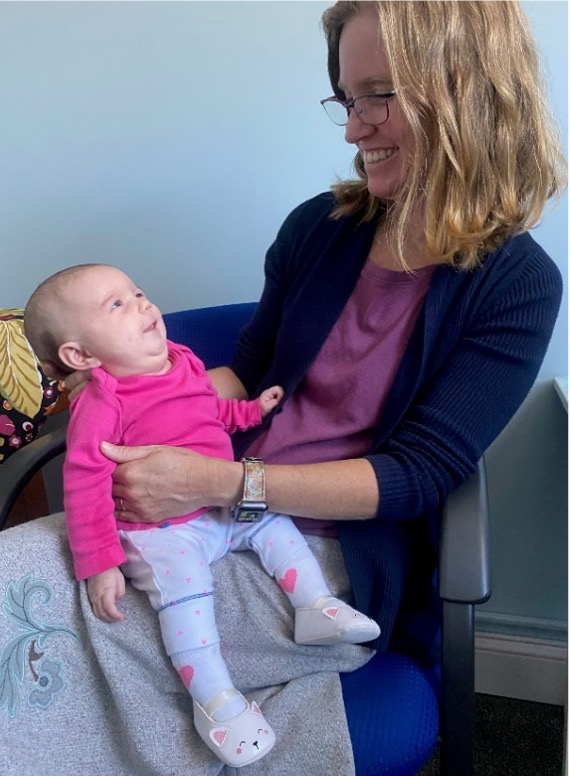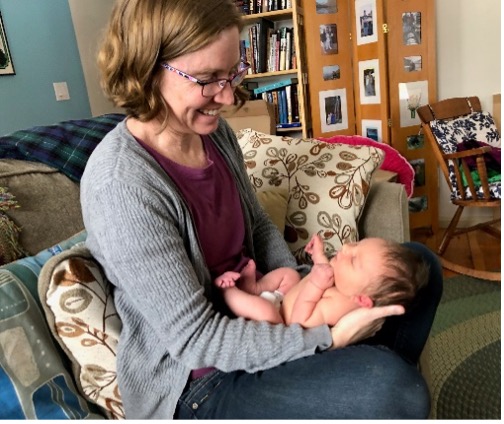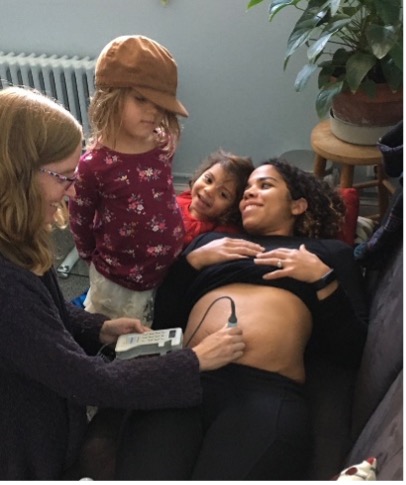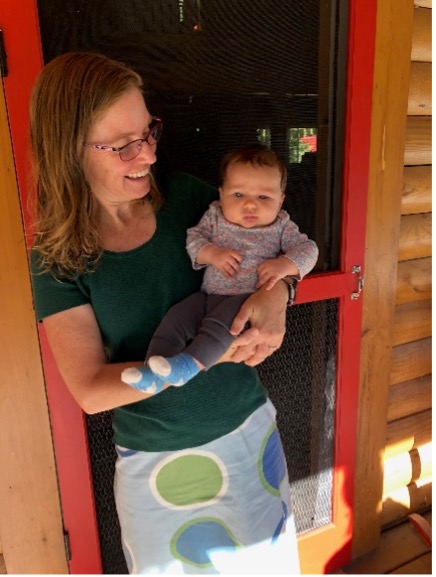|

|
|
Caring for Mothers and the Next Generation of Vermonters |
Q&A with Nurse Midwife April Vanderveer |
|
Dear Fellow Vermonter,
Thirty-four years ago, April Vanderveer came to Vermont to study environmental science at UVM. However, after the life-changing experience of having her first child with the help of a midwife, her career took a major turn: She decided to become a midwife herself. Two college degrees and three children later, April helps women in some of Vermont’s most rural communities welcome their babies into the world. She also continues to care for patients and their families long after birth. The training is tough and the hours are long, but April does this work because, simply put, she wants to help people. |
|

April Vanderveer, Certified Nurse Midwife (CNM) in Lamoille County |
|
The Bernie Buzz team had a chance to sit down with April and learn more about what a day in the life of a nurse midwife looks like – and why people may choose to work with a midwife. April also told us about the challenges facing rural health care, and midwifery in particular. She explains that when rural hospitals are struggling, they usually start by closing their labor and delivery units, as we are sadly seeing now at Copley Hospital. This means that more and more mothers will struggle to access the quality care they need. Unfortunately, with the cuts to Medicaid recently passed in Trump’s so-called “Big Beautiful Bill,” this situation will become even worse as pregnant women and children lose their health insurance and giving birth becomes even more dangerous and expensive.
In spite of the challenges, April continues to do good work. To April, and everyone else who helps welcome the next generation of Vermonters into the world, thank you for all that you do. You are heroes and heroines.
Sincerely,
 |
|
(This interview has been edited for clarity and length.) |
|
 |
|
Q: First off, what is a midwife?
In general, midwives are people who help other people have babies, and they have been around as long as there have been babies. But the nurse midwife, as we know it – and which is what I am – has been around since about the 1920s in the United States, to improve infant and maternal mortality through nursing training and a relationship between the birthing families and the nurse.
Q: What types of midwives practice in Vermont?
There are two basic types of midwives currently practicing in Vermont. There's the Certified Professional Midwife [CPM], who receives specialized midwifery training but are not specifically a nurse. The other type is the Certified Nurse Midwife [CNM], and we help people have babies at home, in the hospital, or at birthing centers – although there are not currently any birthing centers in Vermont. Both CPMs and CNMs can practice in all kinds of situations, and also do primary care: things like contraception, menopause care and annual exams.
Q: How did you decide to become a midwife, and what has your career looked like?
People come to this profession from different walks of life. I was originally an environmental scientist. Then I had a baby and was just tremendously inspired by the midwife who cared for me during pregnancy and birth, and I just thought, wow. I was absolutely amazed that this is the kind of work you can do for a living and just loved my midwives dearly, so I took a kind of a big turn, and decided to do midwifery instead. I would say others in the field are similar to me: They start out on one career path and then just get swept up by the passion of wanting to do this kind of work and help people in this way.
For Certified Professional Midwives, you can go an apprenticeship route, which is what I did. I worked with the midwives who helped me have a baby. I worked with them for several years and had a second baby, and then I decided I wanted something that had a little more stable of a paycheck. For CPMs doing home births, it's a little bit of a gig economy – you care for people who come to you and seek your services.
As a Certified Nurse Midwife, you can work at a hospital and a clinic, and earn a regular paycheck and see a lot of different patients, both for gynecological care and birth. It does require training to become a nurse first and then go back to school and get your Master's degree, so that does tie you up with student loans – but it is a path to job opportunities throughout the state.
I went back to school and became a nurse, and then I actually worked as a nurse for about 11 years in labor and delivery. I took a break from midwifery during that time to raise my little ones, work as a nurse, and just gain hospital experience. And then I went back to school to get my training as a midwife. I worked in a hospital for a number of years, and then during COVID, I went back to home births for about three years. I returned to the hospital in 2022.
Q: Why might someone choose to have a midwife with them when they deliver a baby?
I think a better question would almost be, why wouldn’t some choose to have a midwife with them? The model that we are striving for is midwives caring for low-risk folks, and that obstetricians are really the specialty care providers for higher-risk pregnancies, like people having triplets or people with diabetes. That's really a model that makes sense financially for everyone, too.
In the meantime, I would say people generally pick midwives because we get to know folks, we spend a little more time with folks. We can be a little more holistic in looking at the whole person and supporting them, emotionally and through the process, as well as just physically making sure they're healthy. And oftentimes people who desire natural birth want to work with a midwife, although that's not a requirement. Other folks we work with are like, yes, epidural, sign me up, I want that. And we totally support that because it's a lot about helping the person who's having the baby be empowered to have the experience that they are seeking, right?
Q: How are home births and hospital births different?
I love both of them so much. And I love that people have the choice of where they want to birth. I think that's one of the hallmarks of midwifery: It is really empowering people and giving them lots of choices in this whole journey. For some people, home is just the right place to be. There’s something special about it to see people in their own space, with their children and their belongings and their own familiar foods and their dog. (I love dogs – they are the best labor support, and I wish they could be in hospitals because they're so good!) A big part of home birth practices is also really supporting people in the home the first few weeks after delivery, doing home visits, breastfeeding support and doing well-baby care for the first month. I just love seeing families grow.
Hospitals have more resources. There are bigger hospitals that even have neonatal intensive care units. So there is kind of a gradation between home, birthing centers, rural hospital OB [obstetrics] units, and big tertiary care OB units. People should birth where they feel most comfortable, and they all have their good qualities. |
|
 |
|
Q: What does a typical day look like for you as a nurse midwife?
The fun thing about my job is there isn't totally a typical day. But if I had to generalize, I start at 8 a.m. If no one goes into labor, I will see a full day of people in the office. I might see someone who wants contraception and someone who needs an annual exam, someone who wants to talk about menopause symptoms, several prenatal visits, a postpartum visit, and then I may be over at the hospital to visit patients who have had babies recently, to see them before they go home. When I am on call it is for a 24-hour shift, and I respond to anyone who goes into labor during that shift. I can be called to a birth any time during the day and all through the night. So maybe I'll go home, have dinner and maybe I get a page at, say, 11 o'clock at night or midnight with someone in labor. And then I will go back to the hospital to meet them, until the next midwife takes over at 8 a.m. It's great. It can be very long days, but it is also very rewarding. |
|
 |
|
Q: What is it like to be a midwife in a rural area?
I get to know people really well. People I helped be born several decades ago are now all grown up and having babies for their own. And I still know them. I see them in the grocery store and at Town Meeting. So it really feels very community oriented to be nurse midwife in a rural community.
Rural OB health care in the United States is really struggling. A lot of our folks are on Medicaid, and Medicaid often doesn't even pay for what it costs to care for that person. And so when rural hospitals are struggling, obstetrics is often what gets cut. This is a national problem. New Hampshire has seen half of its rural OB units close in the last 10 to 15 years. We're struggling to find a way forward where people can get the care in their communities and not have to travel a great distance.
Q: What is the most rewarding part of your job? The most challenging part?
It is really hard to single out the most rewarding part. I mean, obviously, I love birth, right? I love that moment when the birthing person just completely forgets I'm there. They are just so in the moment and feeling so empowered by their own achievement. For me, it's just another day at work, but it just hits me over and over that this is a life-changing moment in someone's life, and an empowering experience that can really give them a source of strength for the tough job of parenting. I just love to hold that space where they can do the work and feel like it's a positive experience.
But also, as time goes on, I really love the office piece as well. I love helping people find the contraception that's right for them, or working through a problem they're having with their health. It is really about listening to folks talk about their own bodies, and what they need, to be as healthy as possible. I'm finding that very rewarding as the years go on.
The hours can be challenging. As a rural midwife, it’s also challenging hearing how my colleagues are struggling to help OB units stay afloat. And it’s not just midwives, but also obstetricians, pediatricians and family practices. We're all working together to keep this profession afloat. It’s challenging on all kinds of levels, just to feel like reproductive health care in general is sometimes undervalued. You know, it's the future of humanity. I just feel like it deserves more respect. Reproductive health care always seems to be on the chopping block.
Q: What keeps you going after a difficult day?
That's a great question. The work is challenging and it's exhausting. I like to go in the woods and get in touch with nature or read a book. My husband jokes because I say, I just want to read a book where no one has a baby. Just give me some science fiction, people going to Mars or something – just to check out of this universe for a bit and be in another. That's how I recharge in order to do it again the next day. Ultimately, I think people are drawn to this work out of a strong, strong desire to help people in a very meaningful, direct way. You help one person at a time and it feels like you're able to – I wouldn't say change the world – but you can help influence that person's life. |
|
 |
|
How Can We Help?
My Vermont offices have experienced caseworkers on staff who help Vermonters navigate federal agencies every day. If you think my office can help, please do not hesitate to call 1-800-339-9834 or click here.
If you would like to share your thoughts on pending legislation, or if you have an idea that we could address through new legislation, click here.
Receiving this email as a forward? Click here to sign up for the Bernie Buzz. |
|
|
|
|
 
|
|